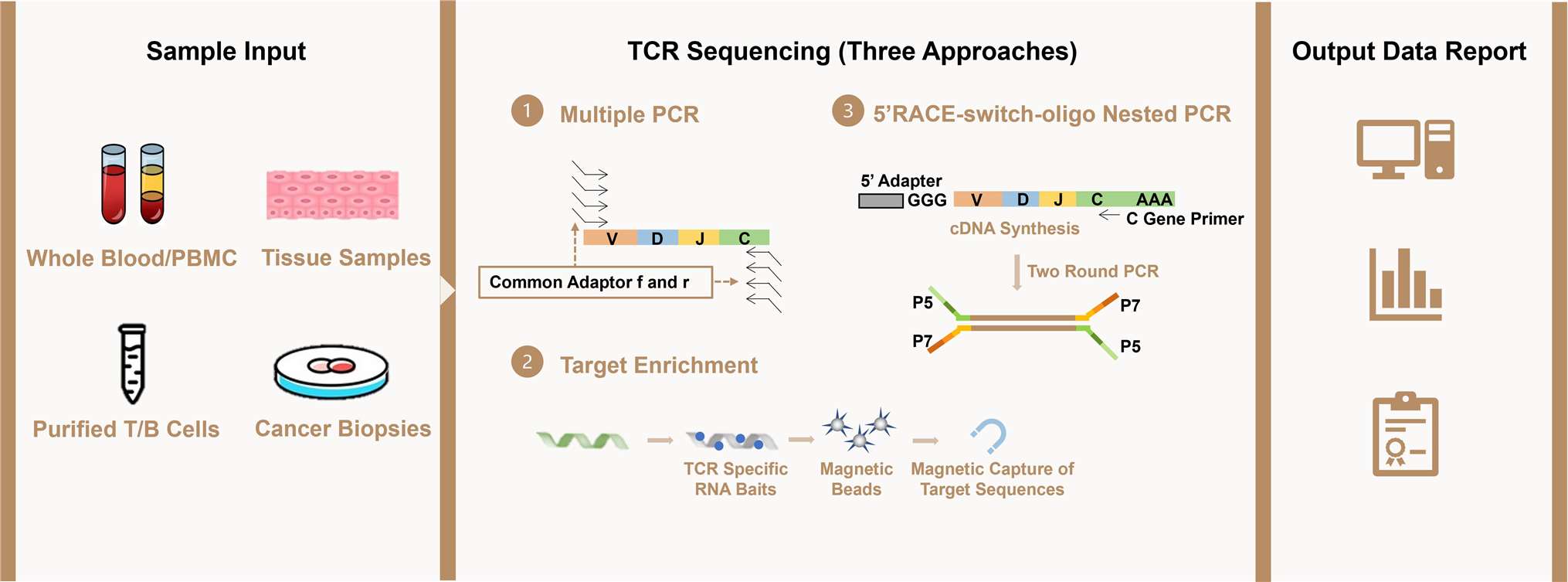Immunomics Services
β Chain of TCR Sequencing Service
The high proportion of αβ T cells and the fact that the β chain consists of the V, D, and J genes make the β chain a major object of study for immunological analysis. With years of experience in immunomics research, CD Genomics provides professional β chain of T cell receptor (TCR) sequencing services to advance immunomics projects.
Introduction to β Chain of TCR
The diversity of TCR complexes is an essential feature of a highly adaptive and healthy immune system. The antigenic specificity of each TCR is primarily determined by the CDR3 of the receptor β chain, given that it is generated by the rearrangement of multiple V, D, and J gene fragments, with random splicing and the addition of non-template nucleotides at the junction sites (N-diversity mechanism) further increasing its diversity considerably.
 Fig.1 TCR β chain gene structure. (Clauze, A., et al., 2022)
Fig.1 TCR β chain gene structure. (Clauze, A., et al., 2022)
Features of the β Chain of TCR
In healthy individuals, peripheral blood TCR rearrangements have been observed to be highly polyclonal. Theoretically, humans could produce a repertoire of approximately 1018 different TCRs. As CDR3 interacts most closely with antigenic peptides, the diversity of CDR3 amino acid sequences provides a measure of T cell diversity in the repertoire of antigen-selected T cells.
Moreover, it exhibits some stability over time and is highly specific to the individual. In the healthy human repertoire, small subgroups of 1-5% of total TCR-β sequences have been observed to persist over time, perhaps suggesting immunoselected pressure in response to low-level chronic antigen exposure.
Rationale of the β Chain Sequencing and Analysis
Analysis of the TCR repertoire, particularly with respect to the CDR3 and TRBV families, is now an important tool for deciphering the mechanisms of autoimmunity, transplantation, cancer therapy, and infectious diseases. The CDR3 region is a preferred target for many TCR sequence studies due to its relevance to TCR-peptide interactions.
In addition, CDR1 and CDR2 play an important role in contact with MHC molecules, thereby influencing the sensitivity and affinity of TCR binding. Knowledge of the sequence of the entire transcript, including CDR1 and CDR2, may be a major advantage in modeling the structure of the TCR and its binding properties.
Our Services
High throughput sequencing (HTS) has revolutionized the field of immunology. The analysis and comparison of TCR repertoires from different subjects and the exploration of associations between immune repertoires and disease can provide important information for disease classification and monitoring, which can be used to develop novel diagnostic, therapeutic, and preventive strategies.
As a pioneer in immunomics, CD Genomics has a professional technical team and advanced equipment, accumulating a wealth of experience through years of immunomics research. We provide efficient and reliable TCR β chain sequencing services to our clients. In addition, we also have a professional bioinformatics team to provide data processing and analysis services to our clients.
Workflow of β Chain of TCR Sequencing

Why Choose Us
| Multiple Library Construction Methods. | |
| Advanced High-throughput Sequencing Platform. | |
| Professional Data Analysis Team. |
CD Genomics has dedicated many years to the study of immunomics, reaching impressive achievements in the study of the immune system and the molecular mechanisms of the immune response, as well as the discovery of new immune-related molecules. Please contact us for more information.
Reference
- Clauze, A., Enose-Akahata, Y., & Jacobson, S. (2022). T cell receptor repertoire analysis in HTLV-1-associated diseases. Frontiers in Immunology, 13, 984274-984274.
